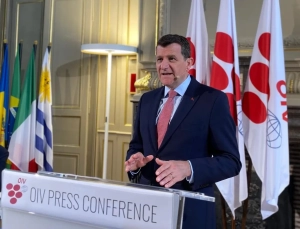Contra Point: Australian Quagmire could be Opportunity for Indian Wine Importers
Posted: Saturday, 31 December 2022 12:40
Contra Point: Australian Quagmire could be Opportunity for Indian Wine Importers
Managing Director and Co-founder Denys Hornabrook launched the bulk wine exchange VINEX in UK as a global B2B trading platform for bulk wine in 2015, adding bottled wines to the mix in 2019. The business is international but he was educated in Australia and worked for BRL Hardy and Kingston Estate, giving him insight into the current plight of Australian industry in the aftermath of Chinese sanctions and unrealistic increase in import duties on their wines.
The mood in Australia is currently one of despondency and frustration with many producers in a really tough spot since they have surplus inventory and are looking for a palatable solution. There’s growing frustration from a lack of perceived action by the industry body and the new federal Government. A significant part of the industry is on its knees with crippling red wine surpluses. Some have been forced into liquidation while others have just ceased to exist. There is every likelihood of an economic meltdown becoming imminent, affecting the livelihoods and mental health of families.
According to Hornabrook, 2.3 billion litres, an equivalent of 256 million 9-liter cases of wine- more than two years of inventory, is in the tanks as Australians get ready for the 2023 harvest. This is 25% above the industry’s 10-year average-and without being earmarked for any market.
Apparently, The VINEX Southern Hemisphere price comparison index shows the weighted average price has dropped 40% for Australia since November 2020. That’s the average of both the white and red wines across the spectrum. Red pricing is down over 60%, and that’s only on disclosed sales. But the price declines are on wine made from record high industry grape prices in 2019 and 2020.
One sees countries with extra inventory participate aggressively at the World Bulk Wine Exhibition (WBWE) held at RAI Amsterdam every year in November. However, it was interesting to see Accolade, the mega Australian producer overtly selling bulk wines.
Early Australian pioneers opened up new wine markets but most producers now wait for subsidies to explore overseas market or expect bodies like VINEX or brokers to bring buyers. The Export Grants program is also woefully inadequate. Surprisingly, very few Australian producers use the advanced Closed Market from VINEX where only invited buyers know prices.
WBWE is an excellent Show to promote their products but few Australian producers have taken the initiative to re-engage UK and European Buyers Post- Covid. Part of the reason for their lack of engagement with European buyers could be that they don’t want to face the buyers who were told over last 10 years to pay China prices for the reds to get supply.
Of course the problem is not uniformly the same throughout Australia. Producers with a diverse customer base are luckier. But a significant number of the 2,156 wineries with over 6,000 grape growers are in a world of pain or denial. It’s worth remembering that the industry contributes significant AU$46 billion to the Australian economy and is a top-20 export earner.
Many producers believe that the dialogue between Australia and China will make China waive off the duties per the FTA that was operational. But today what happens with China is not much relevant and no longer the solution. China’s wine consumption is at record lows and can’t absorb 4 vintages of wine in tank. Chinese demand for wine import has plummeted for wines from all countries. The reality is that China and Russia have been two of the world’s largest markets to absorb the surplus supply. Both are now off the table, which incidentally is not a problem for wine from Australia alone.
This is a catastrophic moment for a significant part of the Australian wine industry. Producers are entering voluntary administration; warm climate grape growers still have their head in the sand, spending AU$7,000/hA or more, not realising they will earn less than AU$3,000/hA income in June 2023. Surprisingly, the State agricultural authorities visit the wine regions talking about flood relief support but no mention of the ‘wine flood crisis’.
With higher interest rates, lower margins and sales, we expect cash flow to become critical resulting in possible loan payment defaults. The only reason there hasn’t yet been a financial collapse yet is because the banks haven’t revalued underlying assets of the wineries but moved on the insolvent trading – a ticking time bomb.
Hornabrook feels if this happened in any other country there would have been widespread protests on the inaction by industry authorities and Government. Part of the problem is that the Australian industry is not unionised and the Government has no motivation to financially assist and facilitate a plan to support the grape growing and winemaking industry.
Australian wine industry needs a structural reset to survive, and prosper again. But the grape growers and winemakers need to relentlessly lobby both the authorities and buyers equally. Australia can’t continue producing its existing level of grapes since it no longer has the international competitive advantage it once had.
Quality, diversity, organic and sustainable viticulture is the way forward, with an increase in white wines over red wines needed. Existing 150,000 ha of vineyards must reduce their annual yields by 25% from the record 2 million tonnes in 2021 to around 1.1 – 1.5 million tonnes.
There is an opportunity now for the Indian importers who are in a good position to negotiate better prices, even though the low-ended wines like Accolade will not benefit from the Indo-Australian Treaty that will come into effect on 31 December, 2022.
According to ET, Australia was India’s biggest source of imported wine In the 12 months through September 2022, with A$16.2 million imports, an 81% gain on the year prior, according to government data. This was without prices coming down. Under the current scenario, Australians are expecting to double their exports even before the treaty comes into play.
Subhash Arora
The Article is based totally on the opinion expressed by Denys Hornabrook and his views expressed to Meininger’s Wine Business International. We are grateful to MWBI for letting us take the material from the Article.




